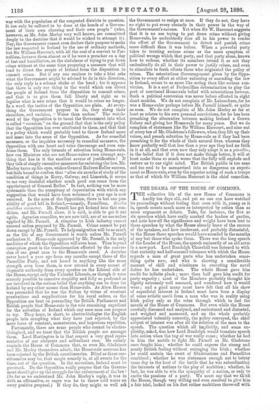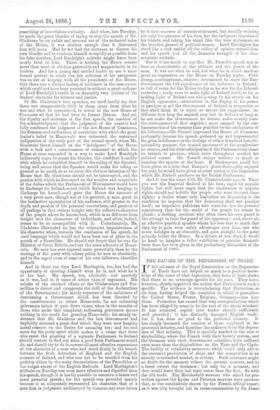THE DRAMA OF THE HOUSE OF COMMONS. T HE collective life
of the new House of Commons is hardly ten days old, and yet no one can have watched its proceedings without feeling that even with it, young as it is, speech counts much more as interpreted by action than as mere argument or debate. Take, for instance, the five or six speeches which have really marked the leaders of parties, and note how all the significance and weight have been lent to those speeches by what the House already knew of the careers of the speakers, and how irrelevant, and probably distasteful, to the House those speeches would have sounded in the mouths of any but those who spoke them. There was the long speech of the Leader of the House, the speech eminently of an old actor in a new part. Lord Randolph Churchill was listened to with that curiosity and half-amused tolerance with which the House regards a man of great parts who has undertaken some- thing quite new, and who is showing a considerable amount of skill and adroitness in executing the novel duties he has undertaken. The whole House gave him credit for infinite pluck ; more than half gave him credit for party sagacity ; most of the Members probably thought his dignity extremely well assumed, and wondered how it would wear ; and a good many must have felt that all his show of superficial interest in Ireland must have been a display of some artistic merit from a man who was in reality using Irish policy only as the reins through which to feel the mouth of the House of Commons. But even while the House carefully discussed and analysed, and caricatured and distorted, and weighed and measured, and on the whole probably appreciated tolerably correctly, the policy conveyed, the chief subject of interest was after all the relation of the man to the speech. The question which all implicitly, and some ex- plicitly, asked, was how Lord Randolph would translate speech into action when the tug of war really came ; whether he had in him the mettle to fight Mr. Parnell as Mr. Gladstone once fought him ; whether he could express the strong and manly British feeling without outraging the Irish ; whether he could sustain the onset of Gladstonians and Parnellites combined ; whether he was statesman enough not to betray some day in the heat of the battle that he was subordinating the interests of nations to the play of ambition ; whether, in fact, he was able to win the sympathy of a nation, or only to excite the passions of a party. We must say that we think the House, though very willing and even resolved to give him a fair trial, looked on his first rather ambitious throw-off with
something of incredulous curiosity. And when, last Tuesday, he made the great blunder of trying to stop the month of Mr. Gladstone by an unfair and unusual use of the technical rules of the House, it was obvious enough that it distrusted him still more. Had he not had the alertness to discern his own blunder and to extricate himself as rapidly as possible from his false position, Lord Randolph's mistake might have been nearly fatal to him. There is nothing the House resents more than want of obvious generosity and magnanimity in its leaders. And for a young and untried leader to use a mere formal pretext to evade the fair criticism of his antagonist was so out of keeping with all the precedents of the House, that there was a distinct feeling of trickiness in the manoeuvre, which could not have been persisted in without a great collapse of Lord Randolph's credit in an Assembly very jealous of its leaders' character for fairness and justice.
Of Mr. Gladstone's two speeches, we need hardly say that there was comparatively little in them apart from what he was and what he represented, to reveal to the new House of Commons all that be had been to former Houses. And yet the dignity and reticence of the first speech, the candour of the acknowledgment that the judgment of the country had fully confirmed the judgment of the last House of Commons, the firmness and enthusiasm of conviction with which the great leader's belief in Home-rule was reiterated, the restrained indignation of the early part of the second speech when Mr. Gladstone threw himself on the " indulgence " of the House with a look and a consciousness of command to which the House at once responded in a way to make Lord Randolph ludicrously eager to repair his blunder, the confident humility with which he submitted himself to the ruling of the Speaker, being well aware that the Speaker would make his ruling as general as he could, so as to cover the obvious intention of the House that Mr. Gladstone should not be interrupted, and the passion with which he descanted on the number and magnitude of the duties which the Parliament of Westminster would have to discharge for Ireland,—and which Ireland was longing to discharge for herself,—all gave the House the measure of a very great man, though not at his greatest, a man great in the instinctive appreciation of his audience, still greater in the depth and passion of his personal convictions, and greatest of all perhaps in that curious insight into the collective character of the people whom he knows best, which is so different from insight into the characters of individuals, and often, indeed, seems to be so incompatible with it Unfortunately, Mr. Gladstone illustrated no less the vehement impulsiveness of his character when, towards the conclusion of his speech, he used language which would not have been out of place in the mouth of a Parnellite. He should not forget that he was the Minister of Great Britain, and not the mere advocate of Home- rule. No man has ever exposed more powerfully than he the strategy of the party with whose policy he now so absolutely, and to the regret even of some of his own followers, identifies himself.
And in these ten days Lord Hartington, too, has had the opportunity of showing himself what he is, and what he is at his best. His speech, too, admirable and masterly as it was, had in it more of action than of argument. His rebuke of the strained efforts of the Gladstonians and Par- nellites to distort and exaggerate the drift of the declarations .of the Government ; his manly exposure of the unfairness of denouncing a Government which has been directed by the constituencies to refuse Home-rule, for not redressing grievances before it puts down crime, when in the mouths of those who make this complaint, redressing grievances means nothing in the world but granting Home-rule ; his steady in- sistance that Mr. Gladstone and the late Government had implicitly assumed a great deal which they were now heaping moral censure on the Tories for assuming too ; and his cool scorn for the party spirit which makes it a crime that those who resist the granting of a separate Parliament to Ireland -should venture to find out what a good Irish Parliament would do, and should try to do it,—were all most effective expressions of the character of a man who had stood firmly in the breach between the Irish detractors of England and the English scorners of Ireland, and who was not to be terrified from his position either by the noisy denunciations of the Parnellites or the vulgar sneers of the English Radicals. Lord Hartington's attitude on Tuesday was even more effective and dignified than his speech, though it is hardly possible to conceive a better and more powerful speech ; for the speech was powerful mainly because it so adequately represented his character, that of a man firm in judgment, undismayed by clamour, not even driven
by it into excesses of counter-statement, but steadily resisting not only the pressure of his foes, but the indignant impulses of his friends, and taking his stand like the true statesman, on the broadest ground of political reason. Lord Harlington has stood like a rock amidst all the eddies of opinion around him, and his speech had all the dramatic strength of his char- acteristic attitude.
Nor is it too much to say that Mr. Parnell's speech was at least as characteristic of the attitude and the power of the man. It was not what he said, but what he is, which made so great an impression on the House on Tuesday night. Cold, strong, contemptuous, sinister ; determined to show the Tory Government the full significance of his influence in Ireland ; as full of scorn for the Tories to-day as he was for the Liberals yesterday ; ready even to make light of Ireland itself, so far as making light of Ireland can add a sting to his attack on his English opponents ; ostentatious in the display of his power to paralyse or aid the Government of Ireland in proportion as they shall think fit to reject or accept his suggestions ; in- different how long the anguish may last in Ireland so long as he can make the Government he detests suffer acutely from the consequences of that anguish ; more amused by the em- barrassments of his enemies than gratified by the enthusiasm of his followers,—Mr. Parnell impressed the House of Commons profoundly because his speech gathered up and impersonated the grim indifference to the feelings of either friends or foes, the unbending purpose, the cynical amusement at the perplexities he creates, and the clear anticipation of the Parliamentary chaos he intends to produce, which have throughout marked his political career. Mr. Parnell enjoys nothing so much as enacting the spectre at the feast. If Shakespeare could but have given us a hint that Banquo's ghost thoroughly enjoyed his part, he would have given us some notion of the impression which Mr. Parnell produces on the British Parliament.
And it was the same with Mr. Chamberlain's speech. There you saw the Imperial Radical at his best, eager for popular rights, but still more eager that the vindication of popular rights should not belittle the people who were to exert those rights ; a leader whose only limitation on democracy is the condition he imposes that the democracy shall not paralyse itself ; an impulsive politician who cares far less for personal consistency than for the credit of the people for whom he pleads ; a dashing assailant who often loses his own guard in the attempt to force the guard of his opponent ; and, above all, an effective practical speaker whom his foes fear so much that they try to gain even unfair advantages over him, one who never indulges in an obscurity, and goes straight to the point actually before the House. In a debate of ten days, it would be hard to imagine a fuller exhibition of genuine dramatic force than has been given in the preliminary skirmishes of the Parliament of 1886.



































 Previous page
Previous page